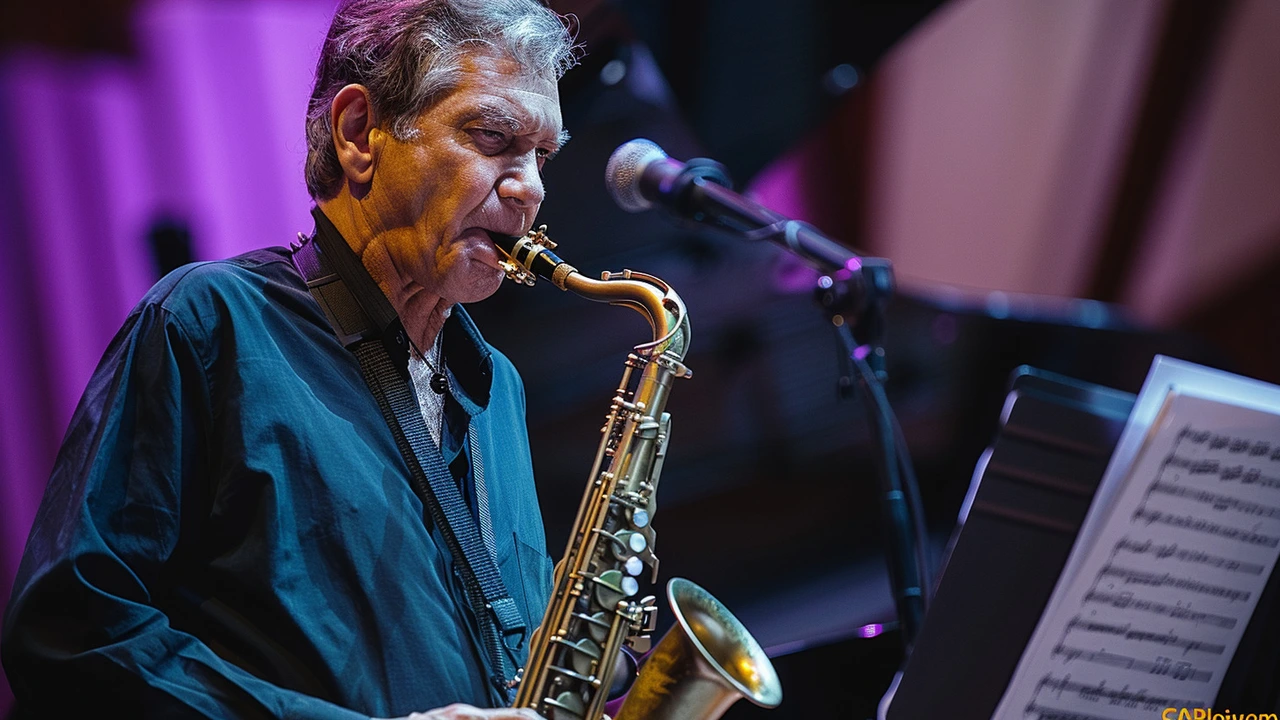The Life and Legacy of David Sanborn
On a somber note, the music world bids farewell to one of its most gifted artists, David Sanborn, who has passed away at the age of 78. Sanborn, a saxophonist whose career spanned over five decades, was celebrated for his profound impact on jazz and beyond. His smooth jazz stylings not only shaped his genre but also captured the hearts of music lovers around the world.
David Sanborn was born on July 30, 1945, and raised in a small town with a lively music scene. His love for music was evident from a young age, and he quickly gravitated towards the saxophone. As he honed his skills, it became clear that Sanborn was no ordinary musician; his unique sound was destined to resonate with a variety of audiences, making him a pioneer in blending different musical styles.
Throughout his illustrious career, Sanborn collaborated with a wide array of artists and bands, ranging from pop and rock to blues and jazz, showcasing his versatility and willingness to explore new territories. His collaborations were not just mere performances but were seen as groundbreaking projects that brought different music worlds together. This approach awarded him several Grammy Awards and numerous other accolades, affirming his place as a titan in the music industry.
Sanborn's influence was not limited to just his music. He was a mentor to many upcoming artists, always eager to share his knowledge and experiences. His passion for music was paralleled by his commitment to teaching, often partaking in music clinics and seminars across the country. This dual legacy of performance and mentorship is part of what endears him so deeply to both peers and fans alike.
In personal reflections, colleagues and friends often highlighted Sanborn's humility and kindness, traits that endeared him to many within and beyond the music industry. His ability to connect with people on a personal level, whether through his music or his interactions, made him a beloved figure in the jazz community and a respected icon worldwide.
David Sanborn's Musical Journey
Sanborn's career was marked by his bold saxophone voice that stood out in every performance. His breakthrough came in the early 1970s when he began playing with famous bands and musicians, quickly making a name for himself as a talented saxophonist capable of handling various musical styles. It was during this period that he developed his signature style—a mix of jazz, pop, and soul, which would come to define his musical persona.
One of Sanborn's most significant contributions to music was his ability to bring jazz to the mainstream audience. Through his appearances on popular TV shows and his recordings, which often topped the charts, he played a crucial role in popularizing jazz. His album "Double Vision", a collaboration with Bob James, is often cited as one of the best jazz albums of all time, cementing his reputation as a master of his craft.
Aside from his musical endeavours, Sanborn was also known for hosting 'Night Music', a television show that brought together musicians from various genres. The show was revolutionary, not just for its content but also for how it portrayed the intersectionality of music, demonstrating Sanborn's deep understanding of music as a universal language.
Even in his later years, Sanborn continued to perform and produce music, never losing his passion for the art form. His regular performances at jazz festivals and other venues around the world were always met with enthusiasm and admiration, evidence of his enduring appeal and influence in the music world.
As we remember David Sanborn, we reflect on a life well-lived, marked by a relentless pursuit of musical excellence and innovation. His legacy is not just in the notes he played but also in the countless musicians he inspired and the countless fans he enchanted. Sanborn's impact on the world of music is indelible, making him not only a legendary saxophonist but also a timeless figure in the annals of music history.







Michael Laffitte
May 14, 2024 AT 22:21 PMDavid Sanborn’s tone was like a warm breeze on a summer night, wrapping listeners in a familiar comfort. His ability to blend jazz with pop made the genre feel accessible without losing its soul. As a fellow music lover I can’t help but feel grateful for the countless playlists that bear his signature sound. He mentored younger saxophonists with a humility that matched his huge talent. The jazz world has truly lost a gentle giant.
sahil jain
May 18, 2024 AT 09:41 AMWhat a legend! His sax riffs still get me pumped up every time I hear them :) The energy he brought to every stage was unmatched.
Bruce Moncrieff
May 23, 2024 AT 00:48 AMDavid Sanborn’s career spanned a half‑century of shifting musical landscapes.
He began his ascent in the early seventies when smooth jazz was still a vague idea.
His tone cut through the air like a bright siren calling listeners toward new horizons.
He never shied away from collaborating with rock and pop icons, which broadened his audience.
Each album he released felt like a diary entry of his evolving artistic soul.
Listeners could hear the subtle nods to bebop in the background of his polished productions.
The Grammy awards he earned were not merely decorations but testimonies of his impact.
His TV show ‘Night Music’ became a cultural crossroads where genres met.
Even in later years he toured festivals with the same vigor that marked his youth.
He taught masterclasses that emphasized tone control and emotional phrasing.
Many saxophonists cite his breath support exercises as life‑changing.
His mentorship extended beyond technique, touching on the business side of music.
The legacy he leaves is a mosaic of recordings, teachings, and friendships.
Fans still gather online to share rare live recordings of his improvisations.
In short his influence is woven into the very fabric of modern jazz.
Dee Boyd
May 25, 2024 AT 22:15 PMWhile the tribute paints a glossy portrait, let’s not gloss over the fact that his forays into commercial pop often diluted the harmonic complexity that purists cherish. The modal interchange he employed was sometimes reduced to a gimmick rather than a genuine exploration of tonal space. One could argue that his mass‑appeal approach contributed to the oversimplification of the genre in mainstream circuits.
Carol Wild
May 29, 2024 AT 23:28 PMIt’s astonishing how the press releases manage to condense an entire epoch of artistic labor into a handful of glowing adjectives, and yet the reader is left with a sense of incompleteness that lingers like a vague aftertaste after a too‑lightly seasoned dish. The narrative perpetually oscillates between reverence and platitude, never quite daring to question the underlying mechanisms that propelled such widespread acclaim, and this omission feels almost conspiratorial in its subtlety. The very act of labeling him a "legend" without delving into the sociopolitical context of his rise seems like an intentional avoidance of deeper scrutiny, perhaps designed to maintain a comforting mythos that shields the industry from its own complexities. Moreover, the repeated emphasis on his mentorship roles, while undoubtedly sincere, is presented in a manner that borders on hagiography, as if to distract from the inevitable market forces that shaped his collaborations and chart successes. In the end, one cannot help but sense that the obituary functions less as a celebration of genuine musical innovation and more as a carefully curated public relations exercise that subtly reinforces existing power structures within the jazz establishment.
Rahul Sharma
June 1, 2024 AT 07:01 AMTo add a bit of context, Sanborn’s Grammy wins came in 1987 for Best Jazz Fusion Performance and again in 1995 for Best Contemporary Jazz Album, illustrating his versatility across sub‑genres; furthermore, his collaborations with Bob James on “Double Vision” not only topped charts but also set a benchmark for production quality, influencing countless producers worldwide. His impact can be measured not just in sales but in the way his phrasing techniques have been incorporated into music curricula across conservatories, from New York to Mumbai, reflecting a truly global reach.
Emily Kadanec
June 3, 2024 AT 00:41 AMHe was pretty good.
william wijaya
June 5, 2024 AT 22:08 PMThe way he balanced technical mastery with emotional storytelling is something that resonated deeply with listeners across generations. It’s a reminder that music, at its core, is about connection, not just virtuosity.
Lemuel Belleza
June 8, 2024 AT 05:41 AMHis style was overplayed at times.
Still, you can’t deny his influence.
faye ambit
June 9, 2024 AT 23:21 PMWhen we reflect on artistic legacies, it becomes clear that the true measure lies in the dialogue they inspire between past and present, inviting each new listener to reinterpret and find personal meaning within the notes left behind.
Subhash Choudhary
June 12, 2024 AT 06:55 AMRest in peace, David. Your music will keep playing in our ears and hearts.